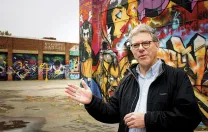In the 1980s, David Price ’77 lived in the Upham’s Corner section of Boston’s Dorchester neighborhood. “It was down and out back then,” he reports, “vacant businesses, boarded-up buildings, empty lots, and a lot of crime.” To see what could be done to effect change, he volunteered as a community organizer and served on the board of the Dorchester Bay Community Development Corporation. Around the same time, he adds, the city government and others were also trying to address the blight by renovating buildings, especially along the main drag, Columbia Road.
As work progressed, Price saw “a transformation around the corner from my home. When you begin to see people out walking around and you are not feeling as concerned about your own safety, that changes the whole quality of life in the neighborhood.” Urban real-estate development, he realized, offered a meaningful and exciting use for a law degree.
He graduated from Boston College Law School in 1991, worked in support of affordable housing, and soon became director of real estate and general counsel for the nonprofit Madison Park Development Corporation. Founded in 1966, Madison Park is based in and focuses its work on Roxbury, and is one of the nation’s first community-based nonprofit organizations to create affordable housing. “When urban renewal came in to Roxbury, it created a lot of vacant lots and big parcels,” Price explains. “Madison Park has many of the bigger developments in and around Dudley Square.”
In 2008, he was hired to lead Nuestra Comunidad, an affordable-housing organization launched in 1981 that is also based in Roxbury’s Dudley Square, but extends its work to nearby Dorchester and Mattapan. (Founded by a group of Puerto Rican neighbors, Nuestra has expanded to include the full range of cultures and ethnicities in Roxbury, which has an African-American majority and many Cape Verdean and Caribbean immigrants.) Nuestra’s $2.3-million operating budget is funded, in thirds, by fees from its properties, contracts with government agencies for housing services, and philanthropic donations.
The organization owns and operates 800 rental apartments, has built and sold 150 homes for first-time buyers, and runs a large foreclosure-prevention program. “We try to help people not get subprime loans, to make sure they have a safe mortgage,” Price says. During an eight-hour class on home financing, Nuestra identifies reasonable terms and advises people to avoid double-digit ARMs, and teaches lessons in budgeting, credit lines and ratings, how to build down payments, and offers a list of safe lenders. For those already at risk, Nuestra offers foreclosure counseling, bail-out strategies, and other resources to help keep people in their homes; it also refers some foreclosure clients to Boston Community Capital’s Stabilizing Urban Neighborhoods program. BCC also lends money to some of Nuestra’s real-estate projects, including Bartlett Place as well as Palladio Hall in Dudley Square, where both organizations are based.
Nuestra owns the land on which Bartlett Place will rise, and is preparing to build there in four phases during the next eight years. Although Price is realistic about urban areas’ cycles of death and rebirth, he sees the new project as instrumental in Dudley Square’s revitalization. “The square is definitely on the up cycle. It’s poised on the brink of major development and opportunities,” he asserts. “The downside could be displacement, gentrification. The big role for us is to plan development so that is mitigated, so that local people can participate as Roxbury takes off in terms of home values—and that’s going to happen here, just as it did in the South End—over the next 20 years.” Already, prices are edging up in Fort Hill, the section adjacent to what will be Bartlett Place, he says, which is why Nuestra and others are also integrating “space for middle-income and low-income people to buy homes and stay here over the long term—so we end up with a real mix of people.”
Bartlett Place will have a public plaza, where Nuestra plans to help run arts festivals, concerts, skateboarding contests, food trucks, and farmers’ markets. Some food trucks already rotate through Dudley Square. The most popular one is also the oldest, M&M Ribs. “It was the first food truck, before you ever had the term ‘food trucks,’ an original that’s been in Roxbury for 20 years,” says Price. “I grew up in North Carolina, so M&M barbecue is just good home cooking to me.”









